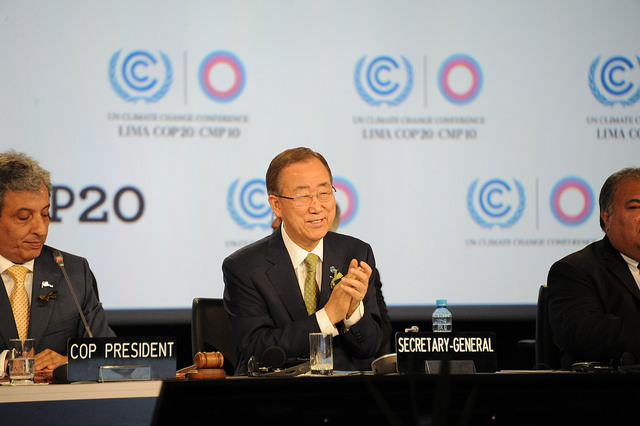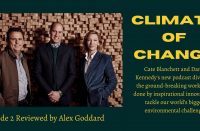As you’ve surely heard, COP21 will be taking place soon in Paris, like a high-speed electric train of acronyms. Oh, the acronyms. The UNFCCC – that’s the United Nations Framework Convention on Climate Change – sure does love its acronyms. COP, by the by, stands for Conference of the Parties, referring to the parties – really, signatories – to the UNFCCC, and not a two-week long rave, as you might think.
As you’ve surely heard, COP21 will be taking place soon in Paris, like a high-speed electric train of acronyms. Oh, the acronyms. The UNFCCC – that’s the United Nations Framework Convention on Climate Change – sure does love its acronyms. COP, by the by, stands for Conference of the Parties, referring to the parties – really, signatories – to the UNFCCC, and not a two-week long rave, as you might think.
Other acronyms, of course, follow. SBSTA, SBI, ADP, REDD, CDM, KP. The relative difficulty in even becoming familiar with such a stream of acronyms parallels the difficulty it takes to really comprehend the process for observers and participants alike.
This year’s COP will be the 21st such global meeting to discuss the urgent issue of climate change – so many urgent meetings one almost tires of repeating the word urgent. World leaders will be attending from November 30th to December 11th, including Justin Trudeau and a number of premiers.
What you may not realize is there will also be tens of thousands of others taking part in these official negotiations, and tens of thousands of others taking part in other ‘civil society’ events and actions outside the UN walls.
Besides the “Big Agreement,” there are literally hundreds of smaller items being negotiated that won’t make the newspapers, but are still vitally important for many.
Let’s start within the walls. Most of the attention will be on the ostensive object of this year’s meeting, coming up with a global plan to decrease greenhouse gas emissions to a point where not as many people and other life forms die, to put it bluntly.
Nobody quite knows if what will emerge will do that, but there are some encouraging signs from a few quarters, not least of which is the recent turfing of the Harper Government.
Besides the “Big Agreement,” there are literally hundreds of smaller items being negotiated that won’t make the newspapers, but are still vitally important for many. These include deals on if or how rich countries may give money to poor countries for adapting to climate change, or how much climate change action will be left to market forces.
For many years, Canada was a leading pariah of the talks, winning a number of “Fossil of the Year” awards given to the most obstructive country in the negotiations. But Canada wasn’t alone, at different times joining countries like the United States, Japan, Russia and Saudi Arabia in bending over backwards to keep the oil industry happy and climate regulations to a minimum.
Besides the rich countries at the talks, there are a few other important groupings. Brazil, India, China and South Africa, known by their pop-band acronym BASIC, formed partly in response to US posturing that developing large-emitters were not doing enough. Their position has been that rich countries should be the first to cut emissions, while defending their own industries to a certain extent.
The more dominant grouping would be the 130 countries that make up the G77 + China, a colloquial reference to when the group had only 78 members. This represents most of the third world, and can exert some considerable influence. Similar to BASIC, they make strong demands that rich countries make the most drastic cuts, while supporting those countries who will be most impacted by climate change, the largest extent of whom are in the third world.
There’s also the small island states, countries who are fighting for their literal life. Widely upheld and supported by civil society, they often punch above their weight, some only having tens of thousands of citizens, but speaking with the passion and righteousness that makes everyone in the room take notice.
Enter the rest of the cast. Besides government representatives, there will also be tens of thousands of people in the overly broad category of civil society. They will be there on behalf of everything from large environmental NGOs, scientists, trade unions, farmers, women’s groups, Indigenous groups, and of course, business interests, who range from green capitalists to the oily slick fossil fuel lobbyists. Media make up the bulk of the rest, including representatives from Alternatives Journal.
Even the participation of all these diverse groups is nothing to take for granted. When the first UNFCCC meetings began, they were a completely technical affair – PPMs and GHGs. Slowly, however, the world woke up to the idea that climate change was big. Like, perhaps the biggest global thing we’ve had to deal with, ever, collectively. Slowly, governments and even environmental organizations have been forced to see climate change as not just a technical environmental problem, but a problem of human rights, that affects cultures, that has gendered impacts, that implicates workers, that could devastate Indigenous communities, etc.
…recent concerns that civil society has become a little too ‘uncivil’ has led to unhelpful interventions from the UN.
Many of those groups are among those pushing the hardest for a good deal. But recent concerns that civil society has become a little too ‘uncivil’ has led to unhelpful interventions from the UN. At the Copenhagen climate disaster, where the world failed to come away with an expected agreement, the UN barred participation from all but 300 of the 30,000 civil society members over the last few days – making it impossible for many groups to meet with negotiators or learn what was being negotiated for them in any way.
I was at those talks, and watched in slow motion as the Copenhagen Accord, a non-binding minimalist agreement negotiated in secret amongst a few countries, was rejected by the plenary, with only a few dozen members of the public allowed to participate. I’ll be at this year’s talk again, joining with other Indigenous groups and both civil and uncivil society.
There will also be likely hundreds of thousands taking part in workshops and protests outside of the talks, perhaps the biggest gathering of ordinary citizens yet. At the same time, hundreds of thousands are expected to join in rallies organized across the planet, including in Ottawa.
That kind of mobilizing and pressure is desperately needed, especially as Trudeau hasn’t yet made any firm climate commitments. This year’s talks will unite the world in hope that we’ll finally see some fruit from this process, but until that actually happens, it’s necessary to keep up the pressure and skepticism for the COP.
Ben Powless is a First Nations citizen with a degree in Human Rights, Native Studies and Environmental Studies from Carleton University. He has worked on climate change, Indigenous rights and tar sands issues with the Indigeneous Environmental Network, Defenders of the Land, Idle No More, Canadian Youth Climate Coalition and Ecology Ottawa.













